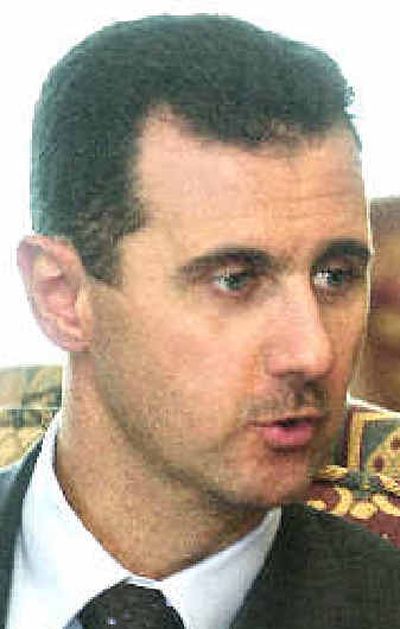Assad disputes WMD charges

DAMASCUS, Syria — A defiant President Bashar Assad said Thursday he wouldn’t bow to U.S. demands to expel Palestinian militant groups and criticized new U.S. sanctions against Syria, disputing Bush administration charges that his country has weapons of mass destruction and is allowing foreign fighters to move across the border into Iraq.
In a meeting of about 90 minutes with American editors, Assad offered no fresh proposals to spur talks on the stalled Middle East peace process — including Syrian attempts to regain the Golan Heights — saying the United States has made it clear that its No. 1 priority is Iraq and not the Israeli-Palestinian conflict.
Still, Assad recognizes that he will eventually need the United States’ help in any future negotiations to win back the territory Syria lost to Israel in the 1967 Mideast war.
“Of course, we cannot abandon our occupied lands and the United States has an important role,” Assad said. “They say this is not now a priority for them so we cannot agree on these points.”
Repeating criticism of the U.S. occupation of Iraq, the Syrian leader appeared resigned to the fact that American forces will be in Iraq for some time and stressed the importance of preserving the territorial integrity of the Arab country.
An eventual U.S. withdrawal “could be this year, next year, 10 years,” the Syrian leader said. “This can be worked out once the integrity” is assured. Assad has previously called for an American withdrawal “as fast as possible” and a principal role for the United Nations.
Assad, 38, met with the editors at the marble-floored Al-Shaab Presidential Palace — or the peoples’ palace — on a hill overlooking the capital city of 5 million.
President Bush imposed sanctions Tuesday that ban all U.S. exports to Syria except food and medicine and forbid direct flights between Syria and the United States. The penalties came as a response to allegations that Syria was supporting terrorism and undermining U.S. efforts in neighboring Iraq. Bush signed the order under a law that Congress passed by an overwhelming vote late last year.
Assad attempted to play down the issue of the sanctions.
“Syria will continue to live its daily life but we will continue to be always open” for dialogue, especially on the Middle East and Iraq, the Syrian leader said.
U.S.-Syrian trade amounts to $300 million annually, and Syrian officials have repeatedly said the sanctions will have little economic impact. The European Union is already ignoring the sanctions and sending a high-level trade delegation to Damascus this weekend.
Syria hosts Palestinian militant groups such as Islamic Jihad and Hamas, which have carried out numerous suicide bombings and other deadly attacks on Israelis. Assad’s government regards them as legitimate groups fighting Israel’s occupation of Palestinian land. Syria is on the U.S. State Department’s list of terrorist-sponsoring countries.